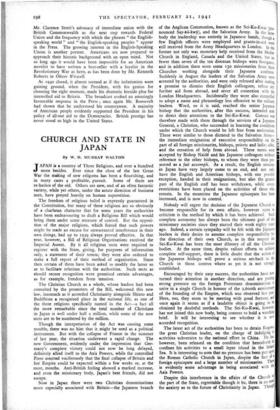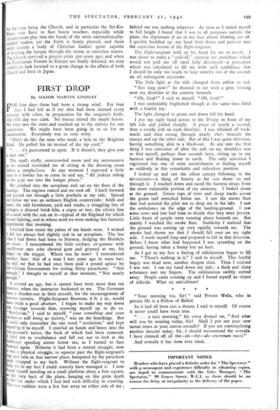CHURCH AND STATE IN JAPAN
By W. H. MURRAY WALTON
JAPAN is a country of Three Religions, and over a hundred more besides. Ever since the close of the last Great War the making of new religions has been a flourishing, and in many cases a profitable, pursuit. Some of them are re-hashes of the old. Others are new, and of an often fantastic variety, while yet others, under the astute direction of business men, have preyed heavily on human superstition.
The freedom of religious belief is expressly guaranteed in the Constitution, but many of these religions are so obviously of a charlatan character that for some years the authorities have been endeavouring to draft a Religions Bill which would bring them under some measure of control. But the opposi- tion of the major religions, which feared that such powers might be made an excuse for unwarranted interference in their own doings, had up to 1939 always proved effective. In that year, however, a Bill of Religious Organisations received the Imperial Assent. By it all religious sects were required to register with the State, giving, for purposes of information only, a statement of their tenets; they were also ordered to make a full report of their method of organisation. Since then certain of them have been asked to modify the latter so as to facilitate relations with the authorities. Such sects as should secure recognition were promised certain advantages, as for example, freedom from taxation.
The Christian Church as a whole, whose leaders had been consulted by the promoters of the Bill, welcomed this new law, inasmuch as it accorded Christianity alongside Shinto and Buddhism a recognised place in the national life, as one of the three religions specifically named in the Act—a fact all the more remarkable since the total number of Christians in Japan is well under half a million, while some of the new sects are to be numbered by the million.
Though the interpretation of the Act was causing some trouble, there was no hint that it might be used as a political instrument But with the collapse of France in the summer of last year, the situation underwent a rapid change. The new Government, evidently under the impression that Ger- many's complete victory could not now be long delayed, definitely allied itself to the Axis Powers, while the controlled Press asserted vociferously that the final collapse of Britain and her Empire could be expected within a few weeks or, at the most, months. Anti-British feeling showed a marked increase, and even the missionary body, Japan's best friends, did not escape.
Now in Japan there were two Christian denominations more especially associated with Britain—the Japanese branch of the Anglican Communion, known as the Sei-Ko-Kwai (pm. flounced Say-kt5-kwy), and the Salvation Army. In the latter body the leadership was entirely in Japanese hands, though few English officers were employed and grants-in-aid were still received from the Army Headquarters in London. In the former not only was monetary help received from the Mother Church in England, Canada and the United States, but no fewer than seven of the ten diocesan bishops were foreigners, and in addition there were some 130 missionaries from these Churches working alongside their Japanese confreres. Suddenly in August the leaders of the Salvation Army were arrested by the authorities, and were only released after making a promise to dismiss their English colleagues, refuse any further aid from abroad, and sever all connexion with the London Headquarters. Incidentally they were also compelled to adopt a name and phraseology less offensive to the military leaders. Word, so it is said, reached the senior Japanese bishop that the authorities, after this success, intended next to direct their attentions to the Sei-Ko-Kwai. Contact was therefore made with them through the services of a Japanese General, a Christian, who succeeded in learning the conditions under which the Church would be left free from molestation. These were similar to those dictated to the Salvation Army— the immediate resignation of executive responsibility on the part of all foreign missionaries, bishops, priests and ladies alike, and the cessation of help from abroad. These terms were accepted by Bishop Naide and his Japanese colleagues without reference to the other bishops, to whom they were then pre- sented as a fait accompli. As a result, the English missions in Japan have very largely come to an end, and not only have the English and American bishops, with one possible exception, handed in their resignations, but also the greater part of the English staff has been withdrawn, while severe restrictions have been placed on the activities of those who remain. In the meantime the Japanese episcopate has been increased, and is now in control.
Nobody will regret the decision of the Japanese Church to become responsible for its own affairs, however open to criticism is the method by which it has been achieved. Such complete autonomy has always been the ultimate goal of the missionary societies since they started their work eighty years ago. Indeed, a certain sympathy will be felt with the Japanese leaders in their desire to assume complete responsibility for the direction of their own Church, as in this respect the Sei-Ko-Kwai has been the most dilatory of all the Christian bodies. At the same time, despite valiant efforts to achieve complete self-support, there is little doubt that the action of the Japanese bishops will prove a serious set-back to the Church in those centres where as yet it is not strongly established.
Encouraged by their easy success, the authorities have now turned their attention in another direction, and are putting strong pressure on the foreign Protestant denominations to unite in a single Church in honour of the 2,600th anniversarl of the founding of the Empire, which was observed last year. Here, too, they seem to be meeting with good fortune, and once again it seems as if a laudable object is going to be obtained by doubtful methods. The Sei-Ko-Kwai, howo:er. has not joined this new body, being content to hold a watching brief. It will be interesting to see whether it is no accorded recognition.
The latest act of the authorities has been to detain Kagao, the great Christian leader, on the charge of indulging activities subversive to the national effort in China. He bls' however, been released on the condition that henceforth bt confines his activities to a small leper island in the Inland Sea. It is interesting to note that no pressure has been put urn the Roman Catholic Church in Japan, despite the fact of foreign episcopate and a large number of missionaries. nal is evidently some advantage in being associated with 6e Axis Powers.
Despite this interference in the affairs of the Church 00, the part of the State, regrettable though it be, there is no no4 for anxiety as to the future of Christianity in Japan. Tho for the time being the Church, and in particular the Sei-Ko- Kwai, may have to face heavy weather, especially while circumstances play into the hands of the more nationalistically- minded leaders, yet the Faith is firmly planted, and there exists already a body of Christian leaders quite capable of bringing the barque through the storm to smoother waters. The Church survived a greater crisis 30o years ago; and when die Totalitarian Powers in Europe are finally defeated, we may confidently look forward to a great change in the affairs of both Church and State in Japan.































 Previous page
Previous page